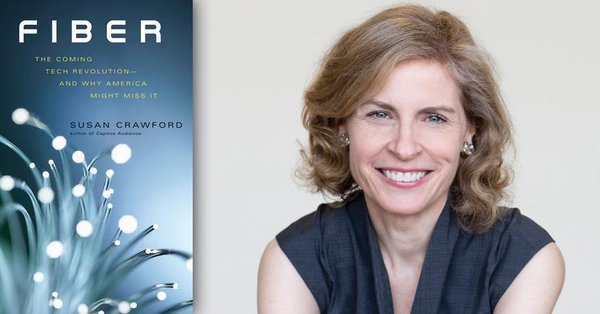We’re very interested in the discussion with Susan Crawford. This Wednesday, April 24, 2019 at 6:30pm the discussion will center around her book, “Fiber: The Coming Tech Revolution – And Why America Might Miss It.”
A little about the author and the book
The world of fiber optic connections reaching neighborhoods, homes, and businesses will represent as great a change from what came before as the advent of electricity. The virtually unlimited amounts of data we’ll be able to send and receive through these hair-thin strands of glass will enable a degree of virtual presence that will radically change health care, education, urban administration and services, agriculture, retail sales, and offices. Yet all these transformations will pale compared with the innovations and new industries that we can’t even imagine today.
In Fiber: The Coming Tech Revolution—And Why America Might Miss It a fascinating account combining policy expertise and compelling on-the-ground reporting, Susan Crawford reveals how the giant corporations that control internet access in the United States use their tremendous lobbying power to tilt the playing field against competition, holding back the infrastructure improvements and competitive pressures necessary for the country to move forward. As a result, the U.S. is swiftly falling behind countries in Asia and Northern Europe—particularly China, which is aggressively moving to ensure 80% of all homes and businesses have cheap, world-class fiber connections in the next few years.
But it’s not all bad news: Crawford also takes the reader to some of the 700-plus cities and small towns across the United States that are building their own municipal fiber networks—a technology that is near-infinite in its capacity to transport data swiftly and seamlessly around the globe. The end result are communities that are well-suited to meet the needs of tomorrow in business, education, healthcare, and lifestyle—at a tiny fraction of the price the cable monopolies charge for far inferior service. As Sen. John McCain said about municipal fiber networks, “[W]e cannot afford to cut off any successful strategy if we want to remain internationally competitive.”
“We routinely underestimate the long-term impact of any new fundamental technology, and I suspect any guesses of mine about the effects of fiber will similarly fall short,” Crawford writes. “We are already seeing dramatic improvements in agricultural productivity that have been driven by fiber-to-farm… Fiber and advanced wireless capability will allow us to manage our use of energy and incorporate renewable resources into local and national power grids… With a large enough consumer market, we could see vastly expanded retail opportunities that allow sellers and buyers to touch and feel goods at a distance… With fiber you can work where you live, not the other way around… New forms of collaboration among musicians and other artists will emerge over fiber.” The possibilities—much like fiber’s data-transmitting abilities—are nearly endless. Crucially, telemedicine requires fiber. So does a first-class education.
FIBER offers an important explanation for why America’s internet access is so terrible and so expensive—but also shows us that this is not the way it has to be. Crawford also makes a strong case for access to the internet to be overseen by the public, like water and electricity, to ensure everyone has equal, excellent access to this critical resource.
Susan Crawford is the John A. Reilly Clinical Professor at Harvard Law School, and a contributor to WIRED. She lives in New York City and Cambridge, Mass. You can read more about the author at www.scrawford.net
Important Discussion
Even though we are in a city this topic of connecting our country is vital. If we want to remain a strong place to live and work in the centuries ahead we must face the fact many of our own fellow citizens are not cnnected at an affordable price as they should be.










